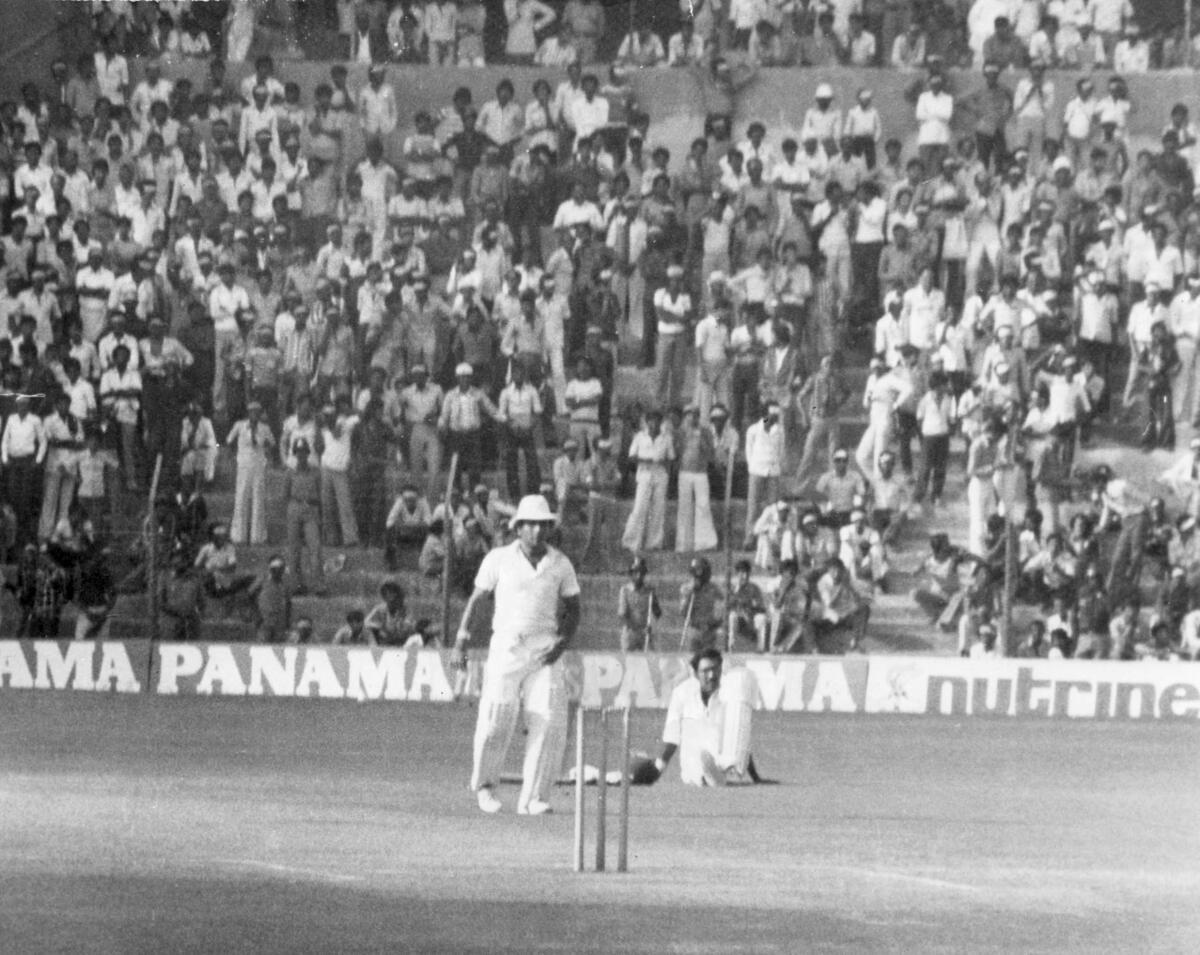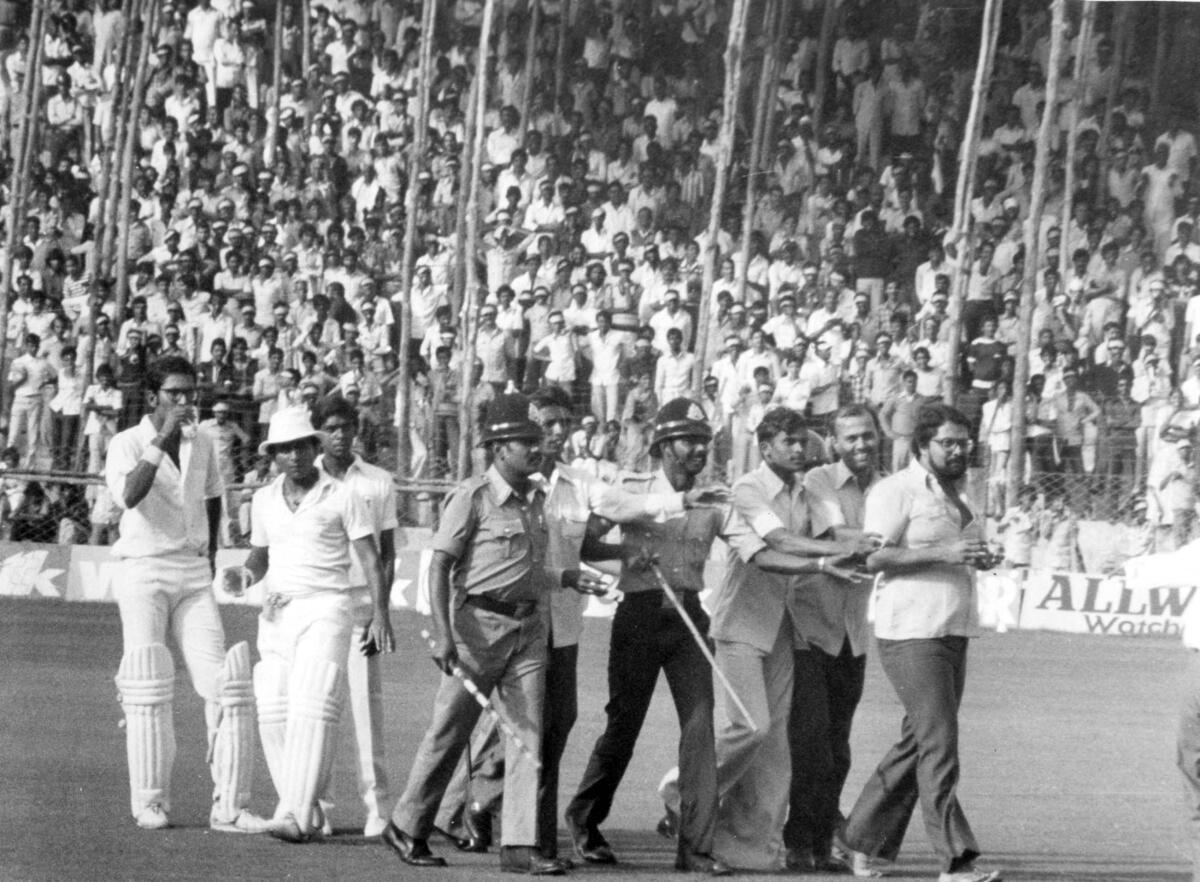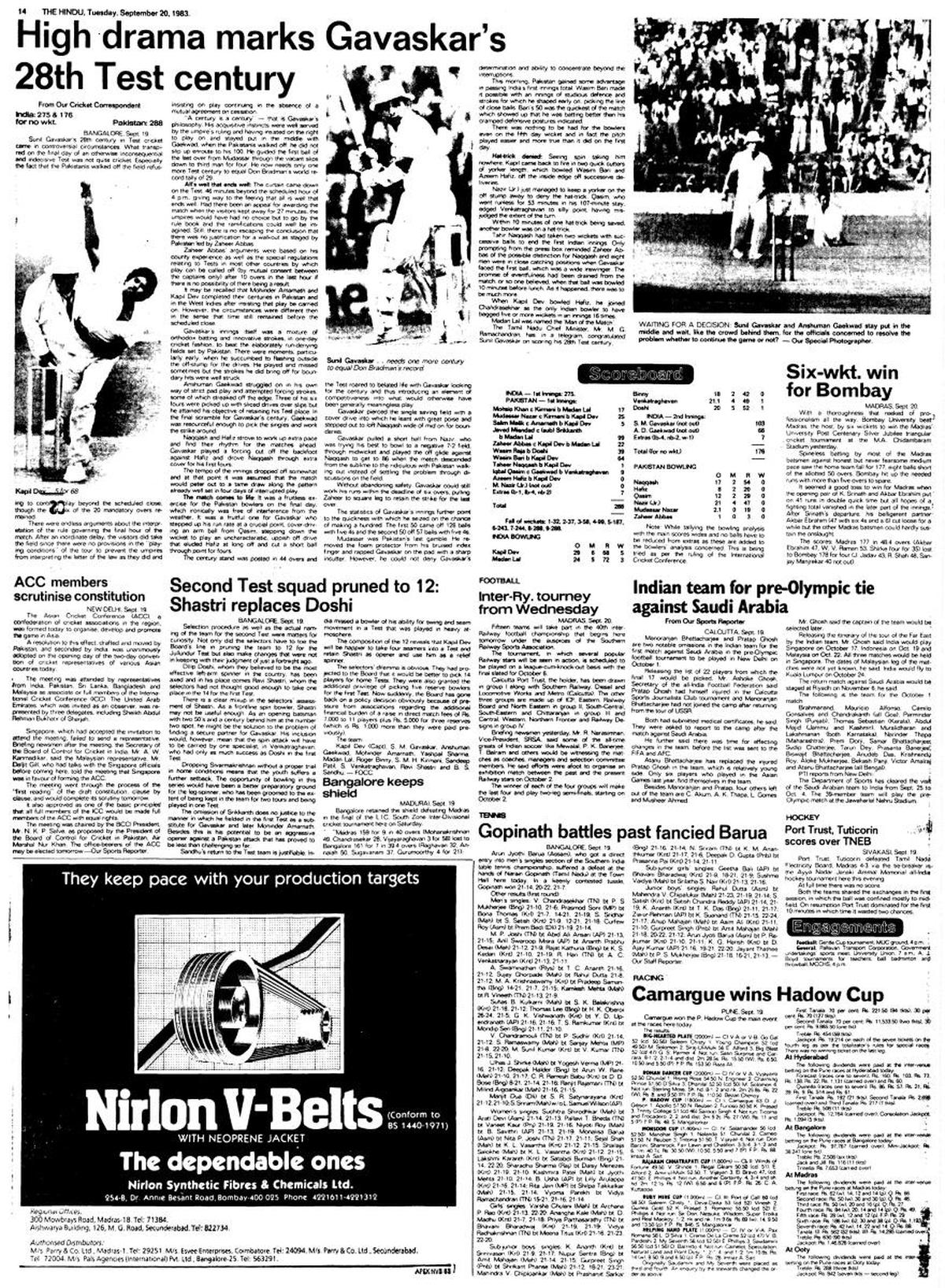
England captain Ben Stokes, seeing the fourth Test at Manchester heading to a sure draw, decided to extend an invitation to draw the match to give his bowlers some added rest.
India had Ravindra Jadeja and Washington Sundar on strike, both inching closer to their individual centuries. The Indian management decided to hold off on accepting the draw to allow the duo to register their hundreds, which sparked a wave of displeasure and chatter from the England players.
The incident has sparked off a raging ‘spirit of cricket’ debate.
As history shows, this wasn’t the first time a game headed for a draw featured a player eyeing a milestone and an unhappy opponent as a consequence. In 1983, during the first Test between India and Pakistan in Bangalore, skipper Zaheer Abbas walked off with his players before the scheduled end when 20 overs of play were still left.
Here’s the story by R. Mohan as published in Sportstar in 1983:
The spirit takes a hard dent
Was the spirit of the game forsaken by Zaheer Abbas and company when they walked out of the first Test? Could the spirit of the law been a better guide than the cold letter of the law proved to be? Were the umpires totally right in forcing the extension of play? Was a batsman’s personal landmark more important than the need to look at the state of the match as a whole when deciding on cessation of play?
These and many other questions can be asked.
The answers will be unclear even on a thorough reading of the rules governing cricket.
Since there was no provision in the playing conditions regarding the mandatory overs period, the umpires had no option but to rely on the laws of cricket alone. The first class game is run on this principle in India. Never has a match been called off before the scheduled close on the final day even if both captains wished not to carry on till close in matches in which the possibility of carrying the game to its final conclusion did not exist.

Gavaskar and Gaekwad waiting for play to resume after their opponents, Pakistan, walking off the pitch en mass.
| Photo Credit:
SPORTSTAR ARCHIVES
Gavaskar and Gaekwad waiting for play to resume after their opponents, Pakistan, walking off the pitch en mass.
| Photo Credit:
SPORTSTAR ARCHIVES
Sunil Gavaskar once declared against England in Kanpur so that there was no need to play the last three overs.
Stalemate: Based on the broad principle, the umpires ran the game till 4 p.m. – on the final day of the Bangalore Test. If there was a mutual agreement on abandoning play at that point, the stumps would have been drawn and all the drama enacted would not have come about.
Gavaskar insisted on his right to play on to a possible century. Zaheer was unwilling to oblige. The resumption of play was made possible by a plea from C. Nagaraj, Secretary, KSCA, to Zaheer Abbas. It was pointed out that a “law and order” problem would crop up if the Pakistanis refused to come on to the field. In view of good relations existing between the teams, Abbas relented though he remained unconvinced about the need to go through all the 20 overs.

The Test came to a close on Gavaskar completing a century and on what is presumed to be a mutual agreement on cessation. How else could the umpires have drawn the stumps with five ball still left to be bowled? That again raises a valid point.
Should a Test match go on until the team batting in the mandatory overs period is satisfied? Is the spirit of the law served if that is allowed to happen? A close look at the letter of the law — Law 17 cessation of play — should .prove most interesting.
Note 6 governing ‘last hour of match — number of overs reads: The umpires shall indicate when one hour of playing time of the match remains according to the agreed hours of play. The next over after that moment shall be the first of a minimum of 20 six-ball overs, provided a result is not reached earlier or there is no interval or interruption of play.
Where they erred: Everyone is aware that an interval for drinks was taken during the last hour. The law further reads “if there is a later interval or interruption, a further deduction shall be made from the minimum number of overs which should have been bowled following the last resumption of play.”
So the law was not fully complied with on the one clear count of the water break. To say the umpires were entirely right would, in fact, be wrong. However, a walkout, whatever the provocation whether Illingworth does not agree with the umpires’ interpretation of intimidatory bowling or Gavaskar does not see eye to eye with an umpiring decision or Zaheer Abbas chooses to question the rules, is totally unjustified.

The report was published in The Hindu on September 20, 1983
The report was published in The Hindu on September 20, 1983
High drama marks Gavaskar’s 28th Test century
Sunil Gavaskar’s 28th century in Test cricket came in controversial circumstances. What transpired on the final day of an otherwise inconsequential and indecisive Test was not quite cricket. Especially the fact that the Pakistanis walked off the field, refusing to continue beyond the scheduled close, though a fair bit of the 20 mandatory overs remained.
The curtain came down on the Test, 46 minutes beyond the scheduled hour of 4p.m.. giving way to the feeling that all is well that ends well.
Had there been an appeal for awarding the match when the visitors kept away for 27 minutes, the umpires would have had no choice but to go by the rule book and the ramifications could well be imagined. Still, there is no escaping the conclusion that there was no justification tor a walkout as staged by Pakistan led by Zaheer Abbas
Zaheer Abbas’ arguments were based on his county experience as well as the special regulations relating to Tests in most other countries by which play can be called off (by mutual consent between the captains only) after 10 overs in the last hour if there is no possibility of there being a result.
It may be recalled that Mohinder Amamath and Kapil Dev completed their centuries in Pakistan and in the West Indies after insisting that play be carried on. However, the circumstances were different then in the sense that time remained before the scheduled close.
Zaheer’s men stand condemned on this count. The matter could easily have been resolved on the field, though finally the authority of the umpires would have to be accepted. Finally, it was accepted but the whole episode left a bad taste. Save for minor injuries to ground staff from chairs hurled on the ground and the minor embarrassment of Zaheer Abbas tossing a soft drink bottle back towards the crowd and seeing it smash harmlessly on the floor of the pavilion stand, the end was better than could have been expected. Especially for Gavaskar.
The solution: The only way out is to arm umpires with greater powers regarding the last hour of the match. Either the teams should be given the option of leaving the field on mutual agreement after ten overs or the umpires should be left as the sole judges of whether a match needs to be taken to its final conclusion by extending play beyond the first 10 overs or beyond the scheduled close. There should be a clause inserted in the playing conditions for future series, specifying in detail the course of action umpires should take and the options left to the teams. Ideally, the umpires should be the sole judges of the state of the match and the need or otherwise of extending the match. The possibility of a decision being reached should be given precedence over such things as a batsman’s century.








